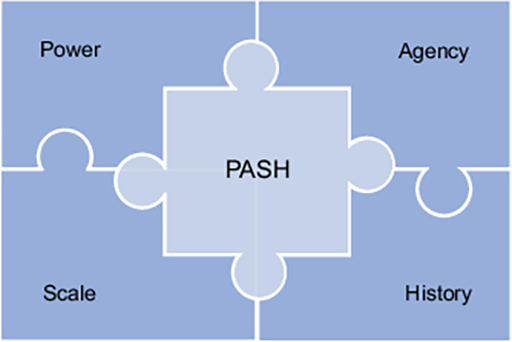9 The four elements of PASH

The four conceptual elements of PASH – Power, Agency, Scale and History – offer a useful means of making sense of global development. Together they provide a way to begin to get to grips with complexity, with each element of the framework helping us to develop critical insights into a particular dimension which can then be brought together to build a more comprehensive analysis of a development situation or issue.
Click through the tabs in Figure 8 and learn more about the four concepts: Power, Agency, Scale and History.
Activity 5: Using PASH in analysing a global issue
Working with all four elements of PASH simultaneously is a challenge. Consequently, it is advisable to start an analysis of a process or situation by working with each element in turn, identifying what each highlights about the context under examination. It is then important to build on this by explicitly working to identify what further insights can be generated by thinking about how the different elements of PASH can interact in the analysis of a situation.
Box 1 presents the initial thoughts of Richard Pinder, one of the authors on the Open University’s Global Development modules, as he attempts to think through the issue of climate change in terms of PASH. Note how Richard uses the ideas of power, agency, scale and history to get an initial grasp on this complex issue. Can you see points in which Richard is thinking with more than one of these ideas together? How does this aid his analysis of the issue?
Box 1: Climate change and PASH
Power is an obvious starting point. Industrialised countries are often seen as the wealthiest and most technologically advanced countries in the world, and it is widely recognised that this often derives from their history of being colonial powers which gave them privileged access to labour and natural resources and enabled them to establish a global ascendency. Therefore, these countries are historically situated in a position of power to shape and dominate the agenda of global negotiations and subsequent targets.
The new polluters, such as the ‘rising powers’ of China and India, whose economic and political resurgence on the global stage gives them the agency to challenge the established global powers, argue they should not have to compromise their new-found growth and therefore attempt to pass the responsibility back to past polluters.
But what about other actors such as the leaders and ordinary people from industrialised countries, rising powers and developing countries? It is clearly evident that these negotiations affect and reflect the decisions of ordinary people about their consumption and demands.
It will be evident from the actors I have mentioned that this is a story that is being worked out on a number of levels. So, scale is significant. There is certainly a strand of the story evident at the local level due to the individual household and business consumption of resources. Actions at the local level have implications for shaping national policy on climate change. This is reflected in negotiations between governments at the international level and the development of a global agenda for all individuals, communities and nations to pursue. It shows decisions are made, and the impact of these decisions, at different scales, from household and community to the international and global.
Inquiring into global issues such as migration or environmental sustainability requires that you engage with multiple perspectives and approaches. PASH provides a particular framework which acts as a prompt for critically thinking about such complex issues and about global development. You may start by examining power relations and ask how it relates to agency, to scale and to history. Questioning and reflecting in this way helps you in evolving new interpretations and alternative insights.
